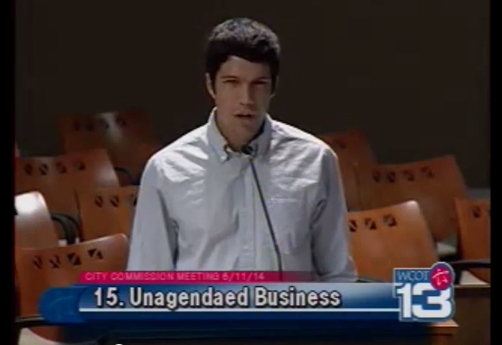Hemant Mehta's Blog, page 2000
June 13, 2014
Should Babies Be Considered Atheists? Depends on Your Definition of the Word
Once again, Richard Dawkins is being criticized for something he never meant — by someone who’s actually on the same side as him.
On Twitter this week, Dawkins posted this perfectly sensible comment:
When you say X is the fastest growing religion, all you mean is that X people have babies at the fastest rate. But babies have no religion.
He’s absolutely right. Babies have no religion. That doesn’t mean they’re atheists in the same way the rest of us are — they’ve put no thought whatsoever into the matter. They’re non-religious in the same way they’re non-political. If you want to say they don’t believe in God, that’s literally true, yes, but virtually meaningless.
It’s like saying your cat’s an atheist. Your cat doesn’t profess a belief in God, but it’s not exactly saying the opposite either. It doesn’t mean atheists get to draw another tally mark on the big board.
So leave it to the Guardian‘s Andrew Brown to take Dawkins out of context. Just look at the headline and subtitle:
There’s no such thing as an atheist baby
Richard Dawkins’ implication that babies have a default theological position of atheism is as silly as assuming a default language or nationality
Dawkins and Brown are actually in agreement… but Brown, for some reason, sees fit to complain about something Dawkins never actually meant.
Check out this awful analogy:
But there are no atheist babies, and certainly no agnostic ones. This is for two reasons. The first is that if we’re going to be consistent, and to demand that babies only be ascribed identities that they themselves embrace, there are no German, British or Chinese children either. There are simply the children of German and English and Chinese parents, who will in due course learn the habits and the rules of the cultures around them and grow into their parents’ language, nationality, food habits — and religious opinions.
That’s bullshit. There are German children and Chinese children — they’re born in those countries and have citizenship there. That’s not the same thing as a theological position which requires some thought. (It’s worth pointing out, though, that ethnicity isn’t the same thing. I call myself Indian for reasons that have nothing to do with my birthplace.)
So what we end up with is a difference in definitions. If you think atheism means a lack of belief in God, then yes, babies are atheists. (But who cares.) If you think atheism means active disbelief in God, then it’d be silly to call babies atheists.
Brown doesn’t need to criticize Dawkins on this. He just needs to clarify which definition of “atheist” he prefers.
Tallahassee Atheist Calls on City Commission To Do Away with Invocation Prayers
Wednesday night, during a meeting of the Tallahassee (Florida) City Commission, atheist Peter Wood called on the elected officials to do away with their invocation prayers:
I’d like to bring an issue that has come to public view and, as far as I know, it hasn’t been addressed in Tallahassee, but if it has I just want to add my voice to the conversation.
Now I’d like to call for a separation of church and state in the city commission meetings of Tallahassee, to stop conducting invocation with a prayer to solely the Christian deity. Now, obviously, there’s a Greece-Galloway U.S. Supreme Court ruling in the month of May and many citizens have expressed concern over this issue, some more politely than others.
Now I’m not angry, I don’t want to start a fight, I’m not even offended by a few small words. But this issue is important to me and to a lot of other people that aren’t here today. Now I’m not asking for Buddha, or Allah, or the Flying Spaghetti Monster to instead become the preferred recipient of city-led prayer (although I do hope someday you are all lucky enough to be touched by His Benevolent Noodle).
What I’m asking this commission to do is to set precedent through either of two options: One: demonstrate full inclusion of belief systems by praying to all known gods and goddesses every invocation; this list would include, but is not limited to: Jesus, Yahweh, Zoroaster, Aphrodite, Neptune, the 1996 US Women’s gymnastics team, Lucifer, and Arnold from the Nickelodeon program Hey Arnold! Either adopt this practice or take a second route, which is to simply drop the issue and keep city hall separate from our private faiths, in adherence with the country’s founding principles.
You may say, as I already have, that these are just a few small words. Why cause such a fuss over just a few small words? While the words themselves are small, the privilege for a specific segment of society to have such language almost automatically instilled in public discourse is the kind of privilege that leads to a divided society. Is this one small change crucial? By itself, no, but as a larger reflection of who we are? Absolutely.
Prayer can be beautiful, but so can fairness. These states were founded as secular entities for a reason. The freedom of or from religion is a core tenet of the City of Tallahassee, the State of Florida, and the United States of America. I hope you take the chance to reaffirm to your constituents that this freedom is important to you as well.
Theism can be wonderfully powerful, moving people to help the poor, console the lonely, defend the weak. But like any system, it can be applied in a negative manner. When I think of church-state interaction I think of “In God We Trust” being implanted on currency so as to fear monger during the Cold War. When I think of church-state separation I think of an efficient, respectful, and respected public sector. The City of Tallahassee has an opportunity to demonstrate its central ambition: to serve the people of this remarkable city, as constituents and not as religious subjects.
Thank you.
Bonus points for including a reference to Hey Arnold!
There’s a brief conversation afterwards in which one of the commissioners reminds Wood that invocation participation is voluntary — which entirely misses the point. Wood respectfully pushes back, reminding them that he’s not challenging the legality of the prayers, only suggesting that the Commission has the option of doing something truly inclusive by doing away with the invocations altogether and making sure that different groups aren’t excluded at every meeting.
They don’t get it. They didn’t change their policy, but kudos to Peter for speaking out regardless. If more people challenged the practice altogether, maybe some of these elected officials would finally get a clue.
Superstition Marathon: The Soccer World Cup Has Kicked Off, So It’s Peak Season for Irrationality
It’s fútbol time! If you’re a soccer fan, like me, the next four and a half weeks are going to be exciting. We’ll witness astonishing ball skills, tactical genius, lots of grit and feats of stamina, and the occasional on-pitch thuggery (four years ago, the Dutch team played a series of shocking anything-goes World Cup games so brutal they would’ve made Attila the Hun blush).
But something else is going to be on clear display: superstition. Whether it’s players’ lucky underwear, their habit of kissing a cross-shaped pendant prior to kick-off, or, after scoring a goal, pointing to the sky in praise of the Creator, unabashedly irrational behavior will be rampant. (England’s Gary Lineker was famous for not shooting on goal during the pre-game warm-up, as he thought he’d be “wasting” perfectly good goal-scoring opportunities.)
The superstition marathon started right on cue yesterday. Before the opening game between Brazil and Croatia, the Croatian goalkeeper, Stipe Pletikosa, could be seen making the sign of the cross. Granted, that’s now so common among athletes as to be unremarkable. However, via allsports.com, we learn that
Croatia’s No. 1 is a devoted Catholic and has a routine before each game: he leans on the woodwork and says a prayer which he believes protects him from getting injured and helps him focus. He also always wears a T-shirt with the Virgin Mary underneath his goalkeeper jersey.
Well, fine. Different strokes for different folks. And we have to hand it to the Holy Mother — Pletikosa sustained no injury yesterday, except the one to his pride when he saw three of Brazil’s shots blow past him into the net, costing his team the match. Evidently, no higher power listened to Croatian players’ and fans’ request for a historic victory.
Before the ref blows the tournament’s final whistle, God will surely be telepathically contacted by hundreds of millions of soccer aficionados begging for divine favors — most of whom will never give a thought to the interesting reality that the fans of the opposing squad are asking for the exact same celestial benefits for their team.
=-=-=-=-=-=-=-=
P.S.: I obviously don’t know the mind of the Almighty, but I have a hunch that when it comes to soccer, He disregards the enormous amount of prayers at World Cup time, seeing as they tend to cancel each other out. Most likely, God prefers the more manageable Clericus Cup, a Vatican-sponsored alternative in which the players are seminary students from all over the world. The team from the U.S. is called the North American Martyrs (no, I’m not making that up).
Given the holiness level of the event, fouls ought not to be a factor during Clericus Cup matches. In reality,
Stats from last year showed that despite all good intentions, some of the 386 players involved in Clericus Cup series got carded 68 times over the course of the season’s 64 games. The yellow card for a foul or unsportsmanlike conduct was brandished 62 times and the red card, which results in expulsion from the game, was wielded six times.
That’s OK. Even with that kind of hotheaded excess, seminarians playing soccer still beats priests wrestling children.
(Image via Shutterstock)
Richard Dawkins Isn’t Wrong to Call Religious Beliefs Childish
Richard Dawkins does what a lot of us atheists do: He calls out bullshit as he sees it. He’s not afraid of tipping over sacred cows. In the process, he gets a lot of criticism because, let’s face it, no one wants to be told they believe in a lie, and he’s the most high-profile atheist out there.
Deborah Orr, writing for the Guardian, is one of those critics (despite being an atheist herself). And her explanation of why Dawkins goes too far is just flawed in so many ways:
It’s all very well to assert that it’s childish or primitive to believe in God. As Dawkins must know, the difference between fairy stories and religious belief is that there comes a time in a person’s life when societal consensus deems it no longer seemly to believe in the former. Likewise, no one would find it cute if they moved in with their boyfriend, only to find that come Christmas he was hanging out his stocking and leaving a glass of advocaat for Santa. There is no such consensus over belief in God, far from it. No British prime minister and no US president has thus far agreed with Dawkins that belief in God is silly and irrational. People are not yet ready to hear it, and ramming it down their throats just closes minds rather than opening them.
How’s that for circular reasoning? People believe in God, so stop telling them they shouldn’t believe in God. It won’t work, you see, because they believe in God.
By that logic, there’s never a good time to say the emperor has no clothes because too many people think otherwise.
This, Orr says, is an example of Dawkins’ “lack of sympathy.” He’s just not very kind to those adults who cling to fairytales. They need to be treated with kid gloves, don’t you know.
The reason Dawkins doesn’t hold back — the same reason most of us don’t hold back — is because we’re trying to wake people up to the fact that their belief in God is irrational. That’s not an easy thing to do. Accepting the truth, for many religious people, means letting go of the safety net of the afterlife and someone watching over you at all times. Most people won’t change their minds on their own because of that. They need someone to shake them out of their childish beliefs. “Societal consensus” won’t change until we push people in that direction.
Orr goes on to say, “I don’t think it’s quite time yet to berate believers as nothing but tiresome fools,” but she never tells us when the right time would be. Is it next year? A decade from now?
It’s an easy question to answer. There’s never a good time to tell people they’re wrong about something around which they’ve based their entire lives.
So you might as well start now.
(Image via Albert H. Teich / Shutterstock.com. Thanks to Lynn for the link)
June 12, 2014
Why Did a Journal for Christian Pastors Give a Platform to a Sexual Predator?
Christian church culture is notoriously careless about protecting victims of child abuse, and this week, I was appalled to discover that Christianity Today‘s imprint publication, Leadership Journal, ran a first-person piece where a child sex offender/former pastor narrated his internal thought process as he went from youth pastor to felon.
A few years into my marriage and ministry I began to believe a lie. The realities of parenthood and marriage were sinking in, and I felt unappreciated at home. From my perspective, I was excelling at work and at home — and this perceived lack of appreciation led me to believe I deserved more.
The first big problem (besides the part where he essentially says it was his wife who drove him to this, which is next door to saying he didn’t have a choice in the matter) is that he never really seems to get that what he did to this minor was rape. Instead, he swaddles the entire story in Christianese, using it to distance himself from his actions and make the whole situation sound… normal. As if it were, at worst, an affair. Just look at the very next paragraph:
Meanwhile, there was someone else in my life that appreciated me very much. Seeking approval and appreciation, I gravitated toward that person. She and I were always happy to see each other and looked forward to each other’s company. Before long, we were texting each other and interacting through social media. Nothing scandalous or questionable — a Facebook “like” or comment here, a friendly text there. Things friends do.
Rhetorical choices aside, everyone should take note that we’re unaware how old his “friend” is.
The second big problem is that Christianity Today‘s editorial team apparently isn’t disgusted by this and thought it’d be a good idea to publish the story.
Yesterday morning, my good friend Becca Rose (below) — a victim of abuse at the hands of her pastor father who had to eventually run away from home to protect herself since the church wouldn’t help her — engaged the managing editor of Leadership Journal, Drew Dyck, on Twitter about his decision to run the piece (especially over the tone and language involved). I’ll let her share in her own words what happened.
I woke up today to Twitter outrage, which is not an uncommon thing, since I follow a lot of social justice-oriented people. But as soon as I saw the subject matter, my stomach dropped. Leadership Journal had published a piece written by a convicted sex offender. His name was withheld, but he had multiple pages of space given to him to tell his story from his own perspective.
It was horrifying to read. A convicted rapist and child molester, explaining how he selected and groomed a young girl from the youth group where he pastored. However, he didn’t use that terminology. The entire piece reads as rape apologia, as if it were something that happened to him, as if sin is something one falls into, rather than actively chooses. The subtitle is actually “the spiral into sin that destroyed my life and ministry,” hardly an accurate depiction of how he preyed upon a child. He spends most of the piece talking about their relationship as if it were an actual relationship — not even revealing the fact that this person he describes is a minor until near the end of the essay. There are bizarre rabbit trails into Scripture, including an inaccurate interpretation of the David and Bathsheba story as being about adultery when the power dynamics of that particular Biblical tale really make it more about rape. Yet he somehow frames his debauchery as adultery, rather than as molestation of a young girl.
As I read the piece, I realized that if I hadn’t known what it was about beforehand, I would’ve thought this affair was entirely consensual. His descriptions of it read as though it were. He says things like “She and I were always happy to see each other and looked forward to each other’s company,” as though this teen girl looked forward to and solicited the relationship. “We were both riddled with guilt and tried to end things,” as if she were guilty of being molested by her pastor, as if it were somehow equitable to his guilt as a rapist. “We had given the devil far more than a foothold,” as if she was an active participant in his predation rather than his victim.
He continues on in this same framing of the story. “We knew that our relationship had crossed a line. Sin had a powerful hold on us.” [emphasis added]. He calls it an “extramarital relationship,” saying “She adored me.”
It made me physically sick. She adored me. Isn’t that what every rapist would like to believe? I had a source from Twitter allege that the victim was thirteen when this pastor began grooming her for his use (though I can’t verify that). He selected her, got close to her, and made her adore him. That’s what child predators do. That’s what sexual abusers are all about.
We. Us. As if a child can be a partner in a relationship with a man in his thirties, one who had an authority position over her. You can see the implications written all over the text. If she adored him, if she wanted it, if she felt guilty, too — why can’t it be labeled adultery, rather than rape? You get the sense that he thinks if only he weren’t married, it wouldn’t have been so bad.
Lest you think the attitude lies solely with the convicted child rapist, let’s look at the decisions made by a Christian editorial team.
The tags for the article are labeled “adultery,” “character,” “self-examination,” “mistakes,” and, most tellingly, “sex.” Sex. Last time I checked, when an adult has sexual intercourse with a minor, it’s not sex, it’s rape. In their own tagging system, Leadership Journal didn’t even acknowledge that this was sexual and spiritual abuse. He didn’t call it rape, but then again, neither did they.
One editor posted a link to the piece saying it was a “cautionary tale.” When pressed on Twitter for a comment, Drew Dyck, the managing editor, responded to my question of “What exactly was the editorial process in publishing a rapist’s justifications for being a child molester?” with,
“I don’t answer rhetorical questions.”
What’s the implication of that answer? It’s clearly obvious that he did not view the piece as rape apologia, and his answer accused me of making a statement for outrageous affect, rather than asking a legitimate question.
But I want to know. I want to know how a piece this horrific was published on a website for Christian leaders. In comments to others, Dyck said that they were not aiming to reach victims, but rather their target audience of pastors. Putting aside the flaw in that logic, as though no pastor or Christian leader has ever been a victim of such abuse, one has to wonder why, exactly, this piece was considered valuable to the Christian leader. Raping a child, framed as adultery? A first-hand account written by a rapist that implicitly blames his victim as an active participant? How is this of value to any leader, any pastor, any Christian?
It’s not a rhetorical question. I want to know.
The idea of all sin being equally sinful has so permeated evangelical Christian culture that they can’t see past it to recognize that consent is serious and that power differentials mean that a pastor raping a child isn’t your run-of-the-mill pastor-commits-adultery story.
The idea of total depravity has completely desensitized Christians from recognizing actual depravity. And apparently, Christianity Today felt pastors might want to take notes from a sex offender. I mean, all sin is sin, right?
Turns Out Atheists and Christians Like Very Different Bible Verses…
A couple of days ago, Valerie Tarico posted an article online in which she compiled a (serious) list of several atheists’ favorite Bible verses.
Bible Gateway’s Andy Rau was surprised by what made the list:
… it’s interesting to compare the “atheist favorites” list with the 100 most popular verses on Bible Gateway, which we compile and share from time to time. While the atheist list and our top-100 list don’t claim to be representative of all atheists or all Bible readers, the differences between the lists are noteworthy. Specifically, few of the atheist choices appear near the top of the top-100 verses list. Most of the verses on the top-100 list make spiritual claims or assurances that assume the reader is a believer; most of the atheist choices understandably represent verses that speak more to the general human condition, or that promote positive values without explicitly linking them to belief in God or Jesus Christ. While the atheist-chosen verses aren’t (for the most part) exactly obscure, they aren’t verses you see cited or discussed frequently by Christians. The atheist-chosen verses also tend to be calls to some kind of moral action, whereas many of the top-100 verses are promises or messages of comfort. It makes me think that as Christians, it might be useful to expand our selection of go-to Bible verses beyond the familiar favorites.
Rau also took note of how often atheists (myself included) quoted verses from Ecclesiastes, a book that he says “rarely crops up in Christian sermons.”
His assessment is spot on. For me, it’s just another reminder at how easy it is to cherry pick verses from a lengthy book to support your already-held values.
(Image via Shutterstock)
Australian News Program Looks Into Christian Indoctrination Taking Place in Public Schools
Australian public schools offer “special religious instruction” (SRI) which is something of a joke when you realize how badly that privilege is abused. In theory, it’s great because kids can learn about the beliefs of all different faiths. But in many schools, the religious education is primarily Christian and the education veers into heavy indoctrination. Volunteers — and they’re always Christian, it seems — often use the time with students to make converts instead of merely educating them about what they believe.
The last time I mentioned this problem, the group called Fairness In Religions In School (FIRIS) was raising awareness of the abuses within the SRI program in part because they said parents don’t really know what’s going on in their kids’ schools. To that end, they put up a billboard in Melbourne to show parents what their kids may be learning:
Beautiful.
The leader of ACCESS Ministries — a Christian group that provides about 96% of SRI in the state, in 850 of the 1300 primary schools — was quick to denounce the billboard, not because it wrongly depicted humans and dinosaurs living at the same time, but because it was mocking Jesus. Which it wasn’t.
Yesterday, an Australian show called A Current Affair looked into ACCESS Ministries and exposed how the organization works:
In the segment, one principal, Joe Kelly, explains what he found when he watched ACCESS volunteers at work:
Rather than teaching about religion, the ACCESS Ministries volunteers were attempting to convert the children into its own brand of fundamentalist Christianity.
[Joe Kelly:] They believe that public schools are mission fields for creating disciples.
The volunteers are made to sign contracts saying they won’t proselytize, but the group’s leader calls the schools “the greatest mission field we have in Australia” and the volunteers break their contracts all the time.
Lara Wood of FIRIS bought the books used in the classes and found that they included hard sells of Christianity. Even some of the coded messages that kids had to crack were found to say, “Jesus is alive! He can be our friend today!”
She also uploaded the teacher’s edition of one of the books for 4-6-year-olds onto the FIRIS site so everyone could see how it clearly crosses the line into indoctrination:
(ACCESS Ministries has threatened legal action against FIRIS if she doesn’t take that book down.)
So what can parents do about this? The easiest solution for now is to do what Wood did: Pull your kids from SRI classes. Most parents don’t do it because they don’t really understand what the volunteers are teaching.
But the evidence is clear at the FIRIS website and elsewhere. The kids aren’t learning about religion. They’re being brainwashing into the Christian faith.
(Portions of this article were posted earlier.)
Faced with Threat of Atheists Speaking at Meetings, Troutman (NC) City Council Caps Invocations at Two Minutes
The Supreme Court decision to allow religious invocations has also opened the door to openly atheistic invocations at government meetings across the country.
In Troutman, North Carolina, Town Attorney Gary Thomas was explaining to the city council what the law now meant for them… and faced with the prospect of an atheist invocation, one alderwoman made a unique suggestion:
… Thomas explained that while invitations to various religious leaders need only be sent within town limits, anyone may ask to give invocations and the town should comply with requests, even those made by atheists.
“Who does an atheist pray to?” [Mayor Elbert] Richardson asked.
Thomas said those who lack a belief in God may ask to read some kind of treatise.
It was at that point that board members started zeroing in on time restraints for invocations.
Alderwoman Betty Jean Troutman suggested a three-minute cap.
But Alderwoman Sally Parker Williams said that may be too long in some cases.
“Three minutes could be a long time,” she said. “If we do get an atheist in here, three minutes will seem like a very long time.”
Williams then made a motion that invocations be limited to two minutes and that any particular person be held to one invocation per year unless there is no one else who wants to give it.
So there you go. The mere threat of atheists speaking at their meetings caused this city council to reduce the invocation time limit. They could do away with the problem altogether if they just removed the invocation from their agenda…
(By the way, you know what’s worse than listening to an atheist speak for three minutes? Listening to a Christian deliver an invocation for three minutes, every damn meeting. Welcome to our world, Alderwoman.)
We all know what this means, of course: We need atheists in Troutman to sign up to deliver two-minute invocations! Just contact the board and let them know you’d like to speak. Bonus points for anyone who finishes in 1:59.
(Thanks to Stephen for the link)
Archdiocese of St. Louis Fights Back Against Accusations That a Priest Didn’t Know Child Rape Was a Crime
The other day, I posted about a deposition given by Bishop Robert J. Carlson (now an Archbishop) in which he told a prosecutor that he didn’t know, in the 1970s, that raping a child was a crime:
Q. Archbishop, you knew it was a crime for an adult to engage in sex with a kid [in the 1970s]?
A. I’m not sure whether I knew it was a crime or not. I understand today it’s a crime.
Q. When did you first discern that it was a crime for an adult to engage in sex with a kid?
A. I don’t remember.
Q. When did you first discern that it was a crime for a priest to engage in sex with a kid who he had under his control?
A. I don’t remember that either.
Q. Do you have any doubt in your mind that you knew that in the ’70s?
A. I don’t remember if I did or didn’t.
He ended up saying some variation of “I don’t remember” 193 times over the course of that conversation. I suspected that it was likely his lawyers told him to admit as little as possible under questioning so that his words couldn’t be used against him in the future, but the execution of that advice just looked awful.
Today, the Archdiocese of St. Louis issued a press release trying to calm the outrage, explaining that of course Carlson knew child rape was a crime. He was only referring to mandatory reporting of child rape when he said responded:
During a press conference held on June 9, 2014, Plaintiff’s lawyer strategically took Archbishop Carlson’s response to a question out of context and suggested that the Archbishop did not know that it was a criminal offense for an adult to molest a child. Nothing could be further from the truth.
…
Charles Goldberg, attorney representing Archbishop Carlson at this deposition, explained that while current Minnesota law makes it a crime for clergy persons not to report suspected child abuse, that statute did not become effective until 1988. What Plaintiff’s counsel has failed to point out to the media is that Mr. Goldberg himself noted at this point in the deposition “you’re talking about mandatory reporting?” (emphasis added). When the Archbishop said “I’m not sure whether I knew it was a crime or not,” he was simply referring to the fact that he did not know the year that clergy became mandatory reporters of suspected child abuse (pgs. 108-109).
The problem is that the very transcript of the deposition suggests otherwise.
If you look at p. 108, Plaintiff’s counsel brings up mandatory reporting, Goldberg (Carlson’s lawyer) objects, and Plaintiff’s counsel says “I’ll ask another question.”
That’s when he asked — very clearly, I might add — about whether Carlson “knew it was a crime for an adult to engage in sex with a kid.” And Carlson said he wasn’t sure if he knew it was a crime back then.
In fact, it isn’t until the bottom of p. 112 that Plaintiff’s counsel returns to the line of questioning that involves mandatory reporting.
The video isn’t out of context. The media reaction isn’t overblown. The Archdiocese is just trying to downplay an astonishing moment of disturbing clarity. Don’t let them get away with it.
Hemant Mehta's Blog
- Hemant Mehta's profile
- 39 followers

















